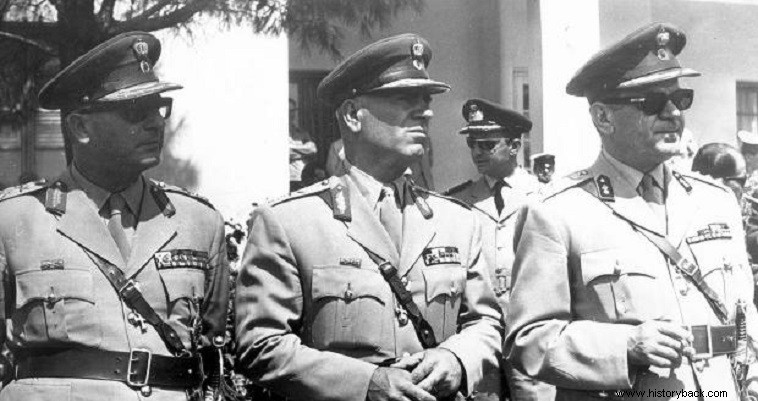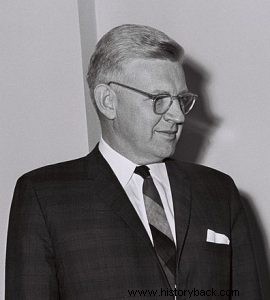
Americans were initially wary of the colonels' movement. Papadopoulos' assurances, a few days later, convinced them to let the situation develop. The reports of the American ambassador in Athens, Philip Talbot, are indicative.
Talbot, in an interview with the "National Herald" newspaper, said the following:"We heard that there was a group of officers who indicated that they would attempt a coup d'état during the first week of April. We didn't know who they really were, but that they were colonels. It wasn't the generals. This worried us, but the date one of our sources gave us was early April.
“Of course we followed the situation very carefully, but that day came and went without anything happening...On April 21, at about 3 a.m. I received a phone call from the gate guard that the nephew of Prime Minister Kanellopoulos was asking for me. He told me that his uncle had been overthrown by a group of men dressed in military uniform. They knocked on the door and finally broke the lock and entered. I said 'let's call the embassy and see what's going on'.
“I tried to call but the line was dead. So we went by car to the embassy. I sent a notice to Washington with everything I knew so far. I said to the nephew:'Look, I don't know what's going on. You will drive your car and I will follow you in the official car. If we find soldiers on the road or anything else I will go round and come back.' We went to see his aunt. He didn't know if they were military or communists wearing military uniforms.
“She did not know where her husband was, whom they had taken with them. They had said:'The king wants to see you immediately' and he had replied:'If he wants to see me he can call me and I will come'. And they said then:'No, he wants to see you'. That's all we know so far. I didn't know how to notify the embassy staff, as most of them lived in Psychiko.
“I was at the embassy with a Marine guard and a communications officer. Through the latter I could send notifications to Washington. After two or three hours some of the embassy staff started arriving and I wanted to know how they had found out. The official in the Greek office in Washington was someone who was in the embassy in Athens until recently.
“He had the directory of the embassy in Athens, which he tried to call. When he couldn't get a line, he was smart enough to think of calling the suburbs, as they might have jammed the main switchboard but not the others. So from Washington he could notify people I couldn't.
“The morning came and the troops were in the city. There was a team from the Pentagon that had visited Athens and there were troops outside the Hilton where they were staying. They sent one of the hotel staff to deliver a note to the embassy. He said they were going to leave in three hours and they didn't know what to do.
“It took me this whole day to find out who was involved in the coup and what was going on. Our military attachés went to the Greek Pentagon to find out what was going on. They found that the king was indeed in the Pentagon and had been there most of the night. I have been trying to contact him unsuccessfully. The Greek Prime Minister was inactive, so we had no access and contacts. Our followers eventually identified two military personnel involved. Their names coincided with those about whom there were rumors.
“It was afternoon when I finally managed to contact the king by phone and ask him if I could see him. He was angry and agitated. He said they did this without his approval and consent and this should not be happening. He did not appear to know these officials. He also said that since the afternoon they had taken control and decided that, in order for Greece to continue, we should swear in them as ministers.
“His first idea was to call them to the palace and he said 'I was going to shoot them,' but they came with tanks. He didn't shoot them, he swore at them. As head of state, he swore them in and they became the official government. Saddened by this development. I reported all this to Washington... Even if he had not sworn them in, they would have taken power. They probably would have kicked out the royal family right away, so I don't think the fact that he swore to them made any difference.
"On the other hand there were consequences some of which were not bad. My people finally managed to get in touch with the colonels who wanted to see me. It was midnight on the first night. For the first time I met Papadopoulos... They openly expressed their support for NATO and relations with the United States.
"They said they were acting to save Greece, as Andreas Papandreou would be a disaster. "They really didn't listen when I told them how hopeless I thought this was and that Washington was very, very unhappy," Talbot said.
But what literally saved the junta was the tension in the Middle East, which began in May 1967 and developed into the Six-Day War.
Talbot reports:“The Six Day War began in June. From the 21st of April until the Six Day War, our position (against the junta) was to be formal and to keep our distance. After this meeting with the military, I did not see them again during all these weeks.
"We had low-level contacts at the embassy to find out what was going on, but we were expressing American displeasure with what was going on. Then came the Six Day War... After the Six Day War, we went through various phases, not the coldest, but not typical either. We started working with them. At that time it was clear that there was no real alternative to taking over the governance of the country."

Philip Talbot.
